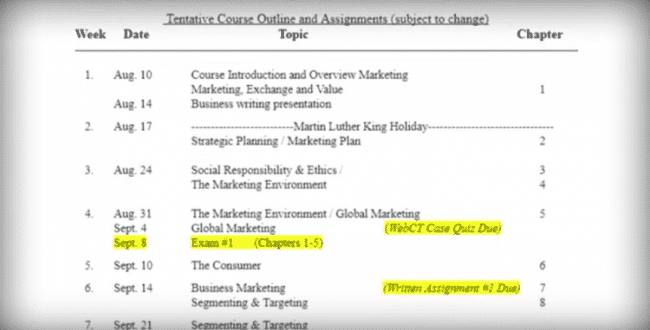When I was in the 6th grade, back when the Sony PSP was still the bomb, my mom promised me that she would buy me one if I made the honour roll for my grade.
This meant that I had to have a 95% overall average in all my classes for an entire school year.
Well, I worked hard enough and was on track… Until I hit the mid-term mark.
By this time, I was tired of studying all the time and not having enough time to play… And that Sony PSP seemed like a distant prize.
So I started spending less time studying, and more time on things that mattered more at the moment – like playing Digimon World 2 on my Playstation One.
Needless to say, I never got that Sony PSP.
You’ve probably experienced something similar.
You start out the semester feeling motivated when you’re not juggling a ton of balls, yet. But since the semester is long, your motivation and organization starts to slip, little by little.
Pretty soon though, you start compromising here and there – until you find yourself sitting on the couch watching Korean dramas, when you should have been working on an essay that’s due in a few days.
Ugh. Not again.
So how do you fight back and keep it all up until all of your finals are done?
Here are 3 things I’ve learned that can help you stay ahead of you schoolwork and finish semesters, just as well as you start them.
1. Get Your Task Management System in Order
First, you need a good way to get things into your calendar so that tasks don’t occupy space in your brain, because you need it for other things – like guessing which guy the Bachelorette is going to give the final rose to.
Here are some tips:
Fill Out Your Calendar Completely at the Beginning of the Semester

This means adding any project due dates, quizzes, exams and assignments to your calendar. You can also break down any big projects or exam revisions into smaller chunks that you can work on throughout the semester. (More on that in Tip #2.)
Add Tasks the Moment You Hear About Them

As soon as you hear about a new to-do, say an additional homework problem for your calculus class, add it to your to-do list or app.
I like using Gmail Tasks because it’s simple and shows up on my Google Calendar, but Thomas likes to use Todoist.
The exact tool isn’t important as long as it lets you add things quickly.
For example, Tom’s friend Martin uses a daily note – a small notebook that he writes down tasks in without fiddling with any due dates.

At the end of the day, he goes through everything he wrote down and schedules them into specific dates, which brings us to…
Have a Weekly Review to Keep Everything Organized
A regular review helps you focus on urgent tasks, while staying aware of any distant due dates that you should start working on. A review can come in many different forms – for example, a retrospective at the end of each week to review what you accomplished and how you can do better.
Personally, I do a daily shutdown ritual and a weekly planning ritual:
- On my weekly planning, which I do either on Monday mornings or Sunday afternoons, I create a daily goal for what I want to get done.
- On my daily shutdown, I move tasks around my schedule and then look at what I have on my plate in the next 2 weeks.
(Check out this podcast episode and this video for more specific details about productivity systems.)
2. Break Things Down into Manageable Chunks and Start Early
According to Parkinson’s Law,
“Work expands so as to fill the time available for its completion.”
You’ve probably experienced this before.
You give yourself an hour to finish a small task, that you’re pretty sure won’t require the entire hour – but it ends up taking the entire time, anyway.
This wastes a lot of time, so here are two tips to help you avoid this.
Break all Assignments down into Smaller Milestones
This tactic helps make the work less intimidating, which means you’ll have less resistance towards starting it.
To do this, firstly, you need to take your assignments and projects, including required readings, and break them down into manageable chunks.
Then, you need to set mini-deadlines so that these chunks are taken care of bit-by-bit, instead of piling them up right before the due date.
Similarly, 2-3 weeks before an exam, you need to sit down and figure out everything that needs to be reviewed, then break that up and spend time each day studying one of those chunks.
Now you may need to come back to certain things several times, but if you’re studying actively and quizzing yourself, you’ll be able to easily determine what your weak points are.
Make the Milestone Due the Same Day You Get the Assignment
This can be a tiny milestone.
For example, if you’ve just been assigned an essay, it could be a 5-minute brain dump of topics you want to write about and possible sources you can look up.
This way, you’re getting started when you still have a very clear memory of all the requirements so you don’t have to spend any time re-familiarizing yourself with things.
3. Work Every Day
This last tip is where most students falter.
When we’ve let the system get disorganized and messy – papers get put in the wrong place or shoved in our bag, tasks get written down on the back of our hands – we’re starting to rely on your brain to remember things.
Remember that this is something you should minimize so you can spend your brainpower on more important things, like figuring out a math problem, or how to stop Gandhi from nuking your cities in Civilization VI.
To avoid this, whether it’s maintaining your organization system or doing the work of studying, you need to work every single day.
The novelist Anthony Trollope once said,
“A small daily task, if it be really daily, will beat the labors of a spasmodic Hercules.”
As Trollope emphasizes in his quote, small but frequent work produces better quality stuff, while being less stressful than if you were to cram it all to the end in a single, herculean effort.
This is because frequency prevents slumps and makes it easier to get into the flow of your work. Cal Newport in How to Win at College said,
“Student slumps occur when you take a long break from work and then find yourself unable to easily pull yourself back into a working rhythm. In order to deny the opportunity for this to occur, you should do some amount of schoolwork every single day.”
As Cal says, to avoid slumps, you should be doing some amount of work every day – even if it’s writing just one sentence for your English essay.
C’mon, you can do just one, right?
In Conclusion
The resistance to starting is what prevents a lot of us from getting things done well in advance – we wait until we have barely any time left. At that point, the panic pushes us past that resistance – but it also stresses us out and causes us to do work that’s not up to our full potential.
To combat this and to consistently perform well in school you need to have a good task management system, in addition to honing the habit of working on small chunks every day.
If you focus on getting just a little bit done each day, you’ll find that you’ll power through each semester with significantly less stress, and far better results.

